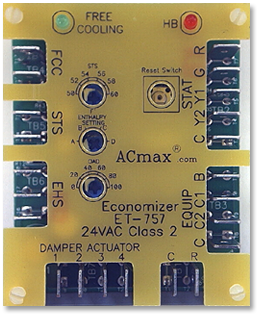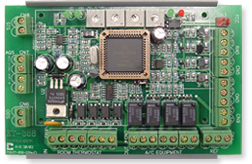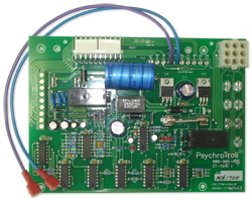Air Economizers Controllers
Economizer controller ET-757
 |
One of the challenges that HVAC design engineers face is developing an air conditioning distribution system to deliver outdoor air to the occupants of a building. This task involves determining whether the outdoor air is acceptable for a free cooling system, and then developing an air intake and mixing control system that will deliver the needed amount of outdoor air to the building at an acceptable cost. This challenge can easily be met with the Economizer Controller ET-757. This controller allows a cooling air handler to supply outdoor air instead of re-circulated air in order to reduce or eliminate the need for a mechanical cooling system during mild or cold weather. If the outdoor air is below the high enthalpy (humidity and temperature) point as set on the board, and based on an analog signal from the enthalpy sensor, the controller will lock-out the compressor (mechanical cooling) and modulate the return and outdoor air dampers to maintain the cooling set point. When the outdoor air enthalpy exceeds the high enthalpy set point, the outdoor air damper moves to the set minimum position for ventilation. The ET-757 meets the requirements of AINSI/ASHRAE/IESNA Standard 90.1-2001, “Energy Standard for Buildings Except Low-Rise Buildings”. Energy saving and improved air quality make the ET-757 attractive to HVAC design engineers and building owners, not to the mention the fact that a system with such a controller usually pays for itself within one or two years. |
|
|
Economizer controller ET-858
Economizer Controller ET-792 & ET-793 - Psychrotroll






